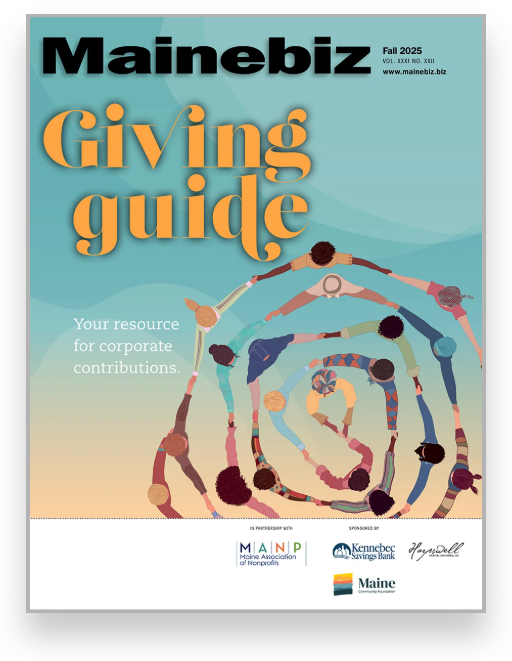
Processing Your Payment
Please do not leave this page until complete. This can take a few moments.
- News
-
Editions
View Digital Editions
Biweekly Issues
- October 20, 2025
- October 6, 2025
- September 22, 2025
- September 8, 2025
- August 25, 2025
- August 11, 2025
- + More
Special Editions
- Lists
- Viewpoints
- Our Events
- Calendar
- Biz Marketplace
Maine retailers will soon say goodbye, for good, to plastic bags
Maine’s long-delayed ban on plastic bags commonly used by retailers is about to go into effect.
Beginning July 1, stores, restaurants and even food trucks and pop-up businesses can no longer provide single-use plastic bags for customers to carry out their purchases.

The ban became state law two years ago, and was originally scheduled to take effect in April 2020. But the pandemic led the Department of Environmental Protection to twice delay enforcement — initially, because of the concerns about transmission of the COVID-19 virus on reusable bags, and then last December due to disruption in the packaging supply chain.
The pandemic also led the city of Portland to suspend the 5-cent charge the city had levied on single-use bags since 2015.
But starting next week, throughout Maine, the bags are banned for good.
The DEP is encouraging consumers to bring their own reusable bags or totes when shopping. Stores may also provide recycled paper bags or reusable bags for their customers.
Grocery stores, box stores, and other large retail stores that provide these carry-out bags must collect a 5-cent fee for each bag, except for reusable bags not made of plastic, which may be given away at no cost. Restaurants and some small retailers are not required to collect the bag fee but must comply with the ban on single-use plastic bags.
Retailers may still provide the single-use plastic bags in store for shoppers to collect loose, unpackaged goods prior to purchase, such as produce, deli foods and bakery items. However, stores that provide bags for that purpose have to also provide a plastic bag recycling station.
The bag ban — the third such statewide measure, after California’s and New York’s — was signed into law in June 2019 as an effort to reduce litter and the amount of plastic in Maine’s waste stream. Plastic bags do not decompose or can break down into microplastics that have a “major negative impact” on the environment, the DEP said in a news release last week.
At the time of the legislation's passage, a Mainebiz survey showed that readers were almost evenly divided in supporting or opposing the ban. It was also welcomed by groups such as the Retail Association of Maine as a more uniform, consistent approach to plastic waste. Other business groups criticized the measure, saying it was unnecessary and costly.
Nationwide, consumption of single-use plastic bags averages one bag per person each day, the DEP said, citing the Center for Biological Diversity.
Mainebiz web partners
Related Content

The Giving Guide
The Giving Guide helps nonprofits have the opportunity to showcase and differentiate their organizations so that businesses better understand how they can contribute to a nonprofit’s mission and work.
Learn More
Work for ME
Work for ME is a workforce development tool to help Maine’s employers target Maine’s emerging workforce. Work for ME highlights each industry, its impact on Maine’s economy, the jobs available to entry-level workers, the training and education needed to get a career started.
Learn More
Groundbreaking Maine
Whether you’re a developer, financer, architect, or industry enthusiast, Groundbreaking Maine is crafted to be your go-to source for valuable insights in Maine’s real estate and construction community.
Learn more-
The Giving Guide
The Giving Guide helps nonprofits have the opportunity to showcase and differentiate their organizations so that businesses better understand how they can contribute to a nonprofit’s mission and work.
-
Work for ME
Work for ME is a workforce development tool to help Maine’s employers target Maine’s emerging workforce. Work for ME highlights each industry, its impact on Maine’s economy, the jobs available to entry-level workers, the training and education needed to get a career started.
-
Groundbreaking Maine
Whether you’re a developer, financer, architect, or industry enthusiast, Groundbreaking Maine is crafted to be your go-to source for valuable insights in Maine’s real estate and construction community.
ABOUT
NEW ENGLAND BUSINESS MEDIA SITES
No articles left
Get access now
In order to use this feature, we need some information from you. You can also login or register for a free account.
By clicking submit you are agreeing to our cookie usage and Privacy Policy
Already have an account? Login
Already have an account? Login
Want to create an account? Register
Get access now
In order to use this feature, we need some information from you. You can also login or register for a free account.
By clicking submit you are agreeing to our cookie usage and Privacy Policy
Already have an account? Login
Already have an account? Login
Want to create an account? Register










0 Comments